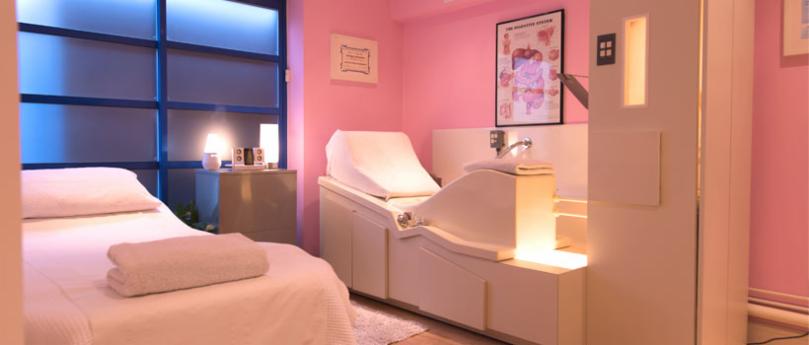My First Colonic irrigation treatment
Back in 2003, I had my very first colonic treatment. I had heard about colonic irrigation from a reality TV show;
I had reached my lowest point and was prepared to try anything.
I was on the road of self-discovery and also became open to complementary therapies then. I was ready to listen.
If you read "my journey", you will know that I used to be a regular painkillers and antibiotics
consumer since my early teens. I had also relied heavily on laxatives
for a year throughout the worst period of my IBS. As a result, I had
caused extreme damage to my gut lining. From the moment I found out
about what this therapy was about and what it entailed, I was keen to
research it and carefully selected a therapist. I will not hide the fact
that I was very skeptical about it but I had to eventually make a
decision.
I kept the clinic details and put them in a drawer. My closest
friend who I asked to come with me, decided to have one himself for
support. It took me approximately 6 months before finally booking my
first appointment. I was lucky to come across a brilliant therapist and
so, started my journey of recovery. However, my first time wasn't such a
good experience... |

|
The colonic irrigation treatmentAs I was lying on the table, trying to be brave and deal with any
discomfort, my therapist reassured me and explained to me why I was
feeling that way. She taught me how to breathe throughout the treatment
in order to relax. The whole process was all a bit traumatic.
A headache
kicked in half-way through and my mouth was so dry, I found it hard to
talk. She explained that the combination of a junk food regime, lack of
water intake and a chronic laxative use, as well as straining for a bowel
movement may have caused irritation to my bowel. She advised that I
should consider retraining myself with the help of colonic irrigation ,
combined with a nutritional plan to regain a natural bowel movement
again.
The treatment was finally over and I just wanted to sleep on the table. I
felt so weak! She sent me away with recommendations on how to deal with
my constipation issue, and aftercare advice but above all to start
drinking water!
|
My friend's colonic irrigation treatment My friend on the other hand, had quite a different experience and came
out of his treatment room feeling great and full of energy! Apart from
the fact that he had felt slightly embarassed throughout the whole
process as it was also his first time. He didn't go through any of the
discomforts that I went through at all.
We went back home and whilst I
was feeling exhausted and needing to sleep, he just wanted to party! It's alright for some...
After the treatment, I firmly told myself that I would never go back again!
Once
I arrived home, the first thing I did was drinking a glass of water, which
I never would have done in normal circumstances; I would normally have
had a coffee. I then went to bed early and slept through until the
morning.
I had a bowel movement the following morning. I felt so
light and happy that day, my body had already forgotten the negative
sides of it all. It brought such a big smile to my face that I had to
call my friend to tell him! I was so overwhelmed as I felt free of
discomfort, free of bloating, free of this whole unfinished business
feeling. It was such a relief! I never knew I could feel that way all
these years; after all, I had convinced myself that this constant
discomfort was an inevitable part of my life.
| 

|
My follow up colonic irrigation treatmentI just had to be brave enough to go back for that second treatment! I am
so glad I did. The second colonic wasn't great either, but each time I
went back for a treatment, there was less discomfort and I embraced the
therapy even more. Over the next couple of years, I managed to reach
my goal of getting a healthier colon with the aid of colonic hydrotherapy and the rest is history.
It is important to stress
that Colonic Irrigation is not a substitute for bad habits and lifestyle
choices, but rather a supportive therapy to aid you with the journey
towards a better you. I hope this explanation will help you in that
journey, and that you will consider colonic irrigation as a positive tool
in helping you to move forward. Give yourself a chance in having
this colonic treatment, and let your own experience become part of your
own recovery as it did to me.
Just keep
an open mind as you read my story. Always remember that one's colonic
experience may vary from one person to another. We all are unique
individuals, and what you may experience throughout your colonic
irrigation treatment, depends on what frame of mind you are in, the level
of stress you may be having at that time in your life, also what your eating and drinking habits are and so on.
The amount of colonic treatments needed from one person to another will vary depending
on the severity of their constipation, bowel's history etc...
I would strongly recommend that you read what food to have and to avoid
before a colonic treatment on my treatment page for a colonic.
|
The importance of keeping your colon clean and healthy
How many bowel movements a day one will have over a given period of
time,
will depend on a combination of factors such as food intake,
exercise regime, health and stress level.

| It varies from one to three bowel
movements per day for some to one or four bowel movements a week for others. A
bowel movement should occur during or immediately after a meal. The
reason why this mechanism occurs is because once our stomach receives
enough food to fill it up; it sends a message to our colon via a
so-called gastro-colic reflex in order to communicate its full content.
This signal generates a wave like motion, called a mass peristalsis
pushing what’s already in our sigmoid colon (the previous region to the
rectum) into the rectum. The bulk now pushed into the rectum will then
trigger elimination as it weighs onto the anus nerves endings.
This is when the enteric nervous system, the gut's own nervous system, engages as it uses its stretch receptors.
The weight of the waste onto the anus nerves endings will stimulate the
stretch receptors. Those will send the message from the colon to the
brain announcing its full content. The brain will then send a message
back to the colon commanding it to let go of its content. This is pretty
much how defecation happens. |
Taking care of your colonOur digestive system knows very
well how to keep its mechanism in check. It should be easy to get things
going on an everyday basis. What happens is that it gets taken for
granted. Nobody has time to take the time for it! Running, running and
running after what we have to accomplish in life. Loosing connection
with our inner-self, the gut!
Some individuals can teach
themselves from a very young age to not respond to this call of nature.
There could be a diversity of reasons for that matter. Some of them
report they always struggled going for number two, growing up and
thinking it was normal by adapting themselves to this pattern. This
would very much confuse the enteric nervous system as every time this
mechanism doesn’t take its course, as it should when the urge occurs,
the waste backs up into the sigmoid colon. The colon has to wait until
the next wave of mass peristalsis stimulates the stretch receptors,
again creating the urge to go.
We were all born with the same
mechanism of elimination when it comes to our body. We were just never really taught properly I guess, how to connect with it, myself included, until I started having problems with my digestive system and bowel movements.
Then
I had to start educating myself more, to get a real understanding about its purpose and functionning. We don’t really think about our
digestive system until it doesn’t do its job properly anymore.
Click here for prices on colonic irrigation
|
If you need anymore information, please, email or call me on (00 44) 795 875 5536 within the hours of 9am to 9pm Monday to Saturday,
I will be happy to answer any enquiries you might have.
Therapies offered at 4 Balance and
Health are not substitutes for traditional medical care by your GP, they
are complementary therapies that may be used in conjunction with
conventional medicine. Should you be aware of any reasons why these
therapies are contra-indicated to you or you have a serious health
problem, please consult your GP prior to their use.



